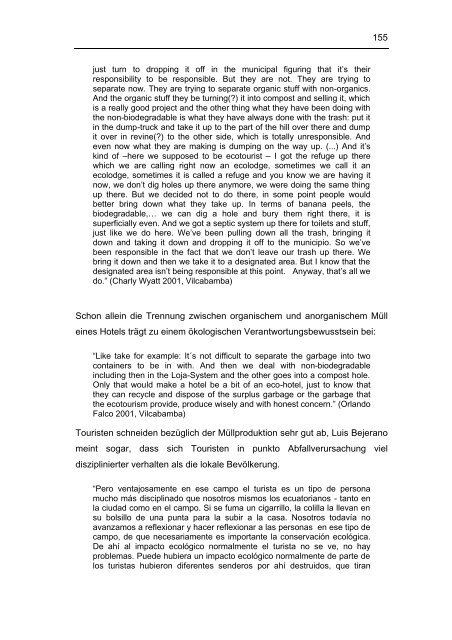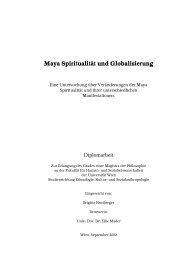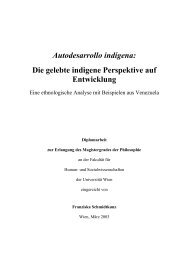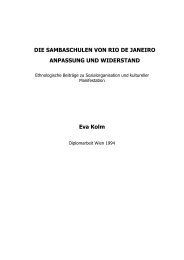Ökotourismus zwischen Sein und Schein - Lateinamerika-Studien ...
Ökotourismus zwischen Sein und Schein - Lateinamerika-Studien ...
Ökotourismus zwischen Sein und Schein - Lateinamerika-Studien ...
Sie wollen auch ein ePaper? Erhöhen Sie die Reichweite Ihrer Titel.
YUMPU macht aus Druck-PDFs automatisch weboptimierte ePaper, die Google liebt.
just turn to dropping it off in the municipal figuring that it’s their<br />
responsibility to be responsible. But they are not. They are trying to<br />
separate now. They are trying to separate organic stuff with non-organics.<br />
And the organic stuff they be turning(?) it into compost and selling it, which<br />
is a really good project and the other thing what they have been doing with<br />
the non-biodegradable is what they have always done with the trash: put it<br />
in the dump-truck and take it up to the part of the hill over there and dump<br />
it over in revine(?) to the other side, which is totally unresponsible. And<br />
even now what they are making is dumping on the way up. (...) And it’s<br />
kind of –here we supposed to be ecotourist – I got the refuge up there<br />
which we are calling right now an ecolodge, sometimes we call it an<br />
ecolodge, sometimes it is called a refuge and you know we are having it<br />
now, we don’t dig holes up there anymore, we were doing the same thing<br />
up there. But we decided not to do there, in some point people would<br />
better bring down what they take up. In terms of banana peels, the<br />
biodegradable,… we can dig a hole and bury them right there, it is<br />
superficially even. And we got a septic system up there for toilets and stuff,<br />
just like we do here. We’ve been pulling down all the trash, bringing it<br />
down and taking it down and dropping it off to the municipio. So we’ve<br />
been responsible in the fact that we don’t leave our trash up there. We<br />
bring it down and then we take it to a designated area. But I know that the<br />
designated area isn’t being responsible at this point. Anyway, that’s all we<br />
do.” (Charly Wyatt 2001, Vilcabamba)<br />
155<br />
Schon allein die Trennung <strong>zwischen</strong> organischem <strong>und</strong> anorganischem Müll<br />
eines Hotels trägt zu einem ökologischen Verantwortungsbewusstsein bei:<br />
“Like take for example: It´s not difficult to separate the garbage into two<br />
containers to be in with. And then we deal with non-biodegradable<br />
including then in the Loja-System and the other goes into a compost hole.<br />
Only that would make a hotel be a bit of an eco-hotel, just to know that<br />
they can recycle and dispose of the surplus garbage or the garbage that<br />
the ecotourism provide, produce wisely and with honest concern.” (Orlando<br />
Falco 2001, Vilcabamba)<br />
Touristen schneiden bezüglich der Müllproduktion sehr gut ab, Luis Bejerano<br />
meint sogar, dass sich Touristen in punkto Abfallverursachung viel<br />
disziplinierter verhalten als die lokale Bevölkerung.<br />
“Pero ventajosamente en ese campo el turista es un tipo de persona<br />
mucho más disciplinado que nosotros mismos los ecuatorianos - tanto en<br />
la ciudad como en el campo. Si se fuma un cigarrillo, la colilla la llevan en<br />
su bolsillo de una punta para la subir a la casa. Nosotros todavía no<br />
avanzamos a reflexionar y hacer reflexionar a las personas en ese tipo de<br />
campo, de que necesariamente es importante la conservación ecológica.<br />
De ahí al impacto ecológico normalmente el turista no se ve, no hay<br />
problemas. Puede hubiera un impacto ecológico normalmente de parte de<br />
los turistas hubieron diferentes senderos por ahí destruidos, que tiran





